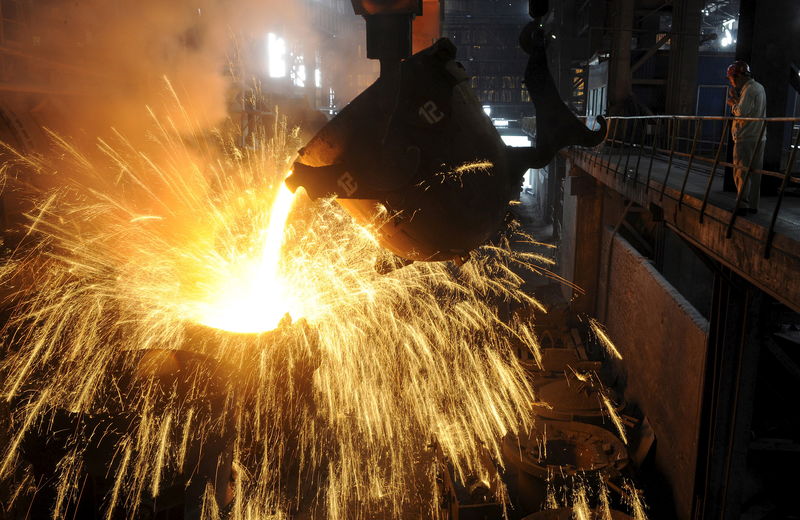By Ruby Lian and David Stanway
BEIJING (Reuters) - Massive overcapacity in China's steel industry is not yet falling, a vice minister said on Monday, as the country's leading steel companies conceded that current output was unsustainable and blamed the restart of mills previously shut.
China is facing anger and calls for trade penalties to block its exports by global rivals, who say it is dumping cheap exports after a slowdown in demand at home.
The world's biggest steel producer has vowed to cut production capacity by 100 to 150 million tonnes over five years from around 1.1 billion tonnes, although its efforts have been complicated by a recovery in domestic steel prices.
"Prices have been improving since the end of last year but there hasn't been any fundamental change in the underlying conditions of the market and no improvement in overcapacity," Vice Minister of Industry Xin Guobin told a conference, adding that protectionism by other countries was not the answer.
China's steel production fell in April from March, but average daily production actually increased from 2.279 million tonnes to 2.314 million tonnes, a record high, according to Reuters calculations based on official data released on May 14.
France and Germany last week urged fellow EU members to tighten trade defences to protect the bloc's companies against imports, such as a recent surge of Chinese steel products.
While China's crude steel output dipped 2.3 percent in 2015, production rebounded in March and April this year. China has rejected suggestions the jump was mostly due to so-called "zombie" enterprises returning to the market in order to profit from the higher market prices.
"In my understanding, the capacity that has recovered production is regular capacity, and not that marked for closure," Zhao Chenxin, a spokesman for China's National Development and Reform Commission, said last week.
"Enterprises stopping and resuming production is mainly a reaction to market changes - adjusting production is normal behaviour," Zhao said.
However, the chairman of Angang Steel (Ansteel) <000898.SZ> said: "China really needs to pay close attention to those mills that are supposed to be eliminated but have restarted."
Tang Fuping said Ansteel had closed down uncompetitive mills located in China's southwest and there was no chance of reopening them or increasing capacity.
OUTPUT "UNSUSTAINABLE"
Chen Derong, the general manager of top producer Baosteel Group <600019.SS>, said the recent increase in Chinese output was "unsustainable" and would prove temporary.
Hebei province, China's biggest steel producing region, has explicitly banned the reopening of capacity that has already been scheduled for elimination.
But industry experts say that closing mills in some provinces that have not produced a tonne of steel in years, but have clung to life in order to qualify for compensation from the central government won't have any impact on market supply or on prices.
India's Jindal Steel and Power (NS:JNSP) said that Chinese and even European steel makers should consider relocating their excess capacity to India where demand is still increasing.

"Many new plants are lying unutilised in China and could be relocated to India," Jindal's chairman Naveen Jindal told the Beijing conference, adding that India could almost double its steel production capacity to 200 million tonnes by 2025.